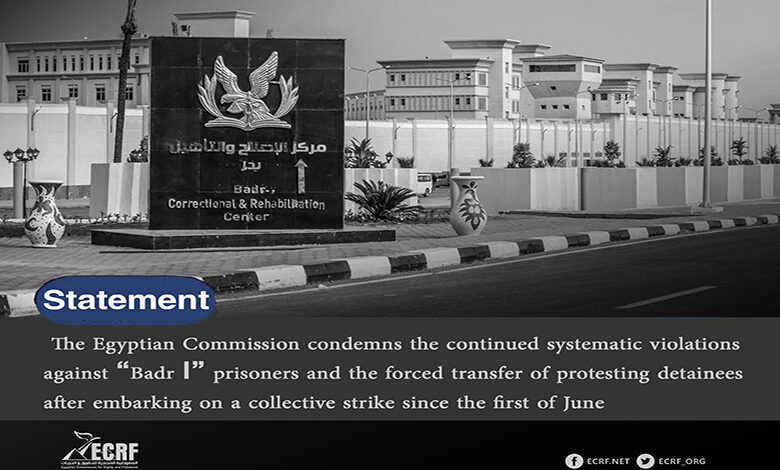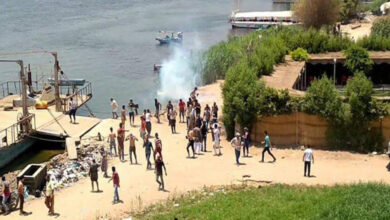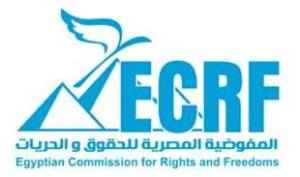The Egyptian Commission for Rights and Freedoms (ECRF) condemns the continued systematic violations against “Badr 1” prisoners and the forced transfer of protesting detainees after embarking on a collective strike since the first of June.
Statement

11 June 2024
ECRF condemns the continuation of the systematic and escalating violations inside the Badr 1 Correction and Rehabilitation Center by the Ministry of the Interior, represented by the Community Protection Sector – the Prison Administration. The Egyptian Commission learned of the expatriation of about 50 prisoners from Badr 1 Prison to the Minya and New Valley Prisons, against the backdrop of the entry of prisoners into a collective strike for more than a week in protest against humiliating treatment and poor conditions of detention, as well as prolonged pretrial detention that exceeded the two-year limit stipulated in the Code of Criminal Procedure, with no indications of referring them to trial. The prison administration followed the same old policy of collective punishment to break the will of prisoners by transferring them to remote prisons.
At the beginning of June, hundreds of prisoners inside Badr 1 prison renewed their hunger strike in protest against the poor conditions. According to the prisoners’ families, the periods of going out for exercise were reduced, in addition to being subjected to humiliating campaigns of body searches. According to the prisoners’ families, the prison administration also responded in a retaliatory manner by deporting about 50 prisoners to Minya and New Valley prisons, in addition to subjecting the remaining striking prisoners inside Badr 1 prison to harsh conditions, including cutting off electricity, water, and sanitation from their cells.
It should be noted that this strike is part of a continuous series of strikes initiated by prisoners inside Badr 1 Prison, whether individually or collectively, in the context of the inhumane living conditions they face.
In October 2021, the Ministry of the Interior opened the Wadi El-Natroun Centers Complex – which includes 6 centers – and in December of the same year it opened the Badr Correctional and Rehabilitation Centers Complex, and later opened other correctional and rehabilitation centers, and geographic correctional centers – formerly central prisons – in various governorates of the republic.
At the same time, the authorities promoted the new prisons as contributing to improving the living conditions of prisoners and developing the penal philosophy towards reforming and rehabilitating prisoners. But on the ground, and according to the testimonies of prisoners and their families, these centers differ from the old prisons only in the arbitrary use of technology, as violence based on individuals/prison officials has been replaced by the use of modern machines and technology, especially in the absence of any real improvement in the policies applied and the living conditions of prisoners; deliberate medical negligence still exists, as despite the presence of equipped and modern medical centers inside these new prisons, this did not contribute in any way to improving the medical care provided to prisoners. Rather, the number of deaths is constantly increasing, which is estimated at about 18 deaths since the transfer of prisoners to the new prisons.
Dire living conditions
Since the last week of May until the first week of this month, prisoners have suffered from a complete blackout of electricity, in addition to their continued suffering since their transfer to those centers from the cameras installed inside every corner of the prison, and inside the cells, and as a result, constant surveillance and an almost complete reduction in human interaction, not to mention the control of lighting by prison administration, and keeping it on 24 hours a day, which prevents prisoners from sleeping, and necessarily causes both psychological and physical problems, all the way to the video conference used in trial sessions, which contributes to the violation of the right of the in defending himself, or even talk about the living conditions and violations he is exposed to inside his place of detention, especially with prison officers present during the video sessions.
Visits
In addition to the poor living conditions, families and their loved ones face harsh conditions during the visitation process, starting with the families being forced to wait long hours until they can reach the visiting area, to refusing to enter most of what the families bring, as the list of prohibited items includes papers and pens. As for food, it is allowed within narrow limits and with considerations that vary from one visit to another. The prison administration violates the prisoners’ right to speak privately with their families, by placing recording devices on family visitation tables and allocating each table to a specific prisoner’s family, ensuring that it would be known which recorded conversation belongs to which prisoner.
ECRF demands that the administration of the Badr 1 Rehabilitation Center stop the systematic violations it is carrying out against prisoners, and recommends the following to the Ministry of Interior, represented by the Community Protection Sector – the Prison administration:
- Stop using surveillance cameras inside cells on a continuous basis, in violation of national laws and international treaties ratified by Egypt.
- Refrain from using continuous, uninterrupted lighting as a means of further punishment imposed on prisoners, in violation of Article 14, Paragraph B, of the Model Rules for the Treatment of Prisoners.
- Stop the policy of alienation that is continuously practiced by the Prison Service sector.
- Opening family visits on a regular basis and without restrictions.
- Activating Article (71) of the internal regulations for organizing prisons, which stipulates that the duration of the visit is “a full sixty minutes.”
- Abolishing Article 42 of the Prison Organization Law No. 396 of 1956, which codifies the prohibition of visits inside Egyptian prisons for vague and unclear reasons.
- Egypt’s signing of the Optional Protocol to the Convention against Torture and Other Cruel and Inhuman Treatment, and subsequent permission of field visits by international organizations inside prisons in Egypt, which opens the way for greater and realistic knowledge of the conditions of places of detention, as well as the existence of independent oversight independent of the executive authority.
- We recommend treating all prisoners humanely, and committing to protecting the rights stipulated in the Egyptian Constitution for prisoners in accordance with Articles 55 and 56 of the Constitution. The Constitution requires everyone who is arrested, imprisoned, or whose freedom is restricted to be treated in a way that preserves his dignity. He may not be tortured, intimidated, coerced, or harmed physically or mentally, and his detention or imprisonment may only be in designated places that are humanly and health wise appropriate.





